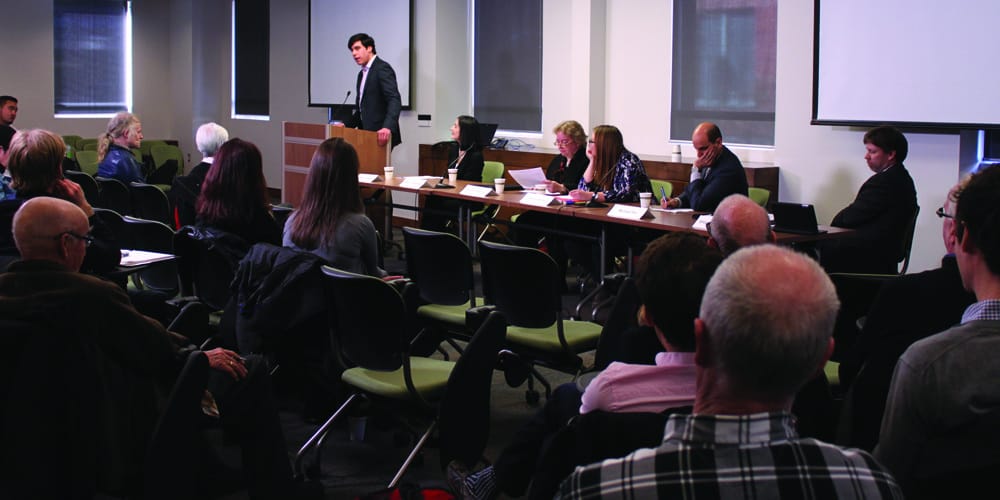Since its introduction in February, numerous academics, student leaders, and politicians have voiced concerns about the Fair Elections Act. Among other provisions, the bill disallows voters from casting ballots if another elector vouches that they are qualified and disallows the use of Elections Canada voter cards as identification at polling stations. An estimated 120,000 Canadians voted this way in the 2011 federal election.
Some critics contend that the act will prevent young and low-income Canadians from casting ballots. Pierre Poilievre, Minister of State for Democratic Reform, explained why he feels that act is needed in a press release: “The Fair Elections Act will ensure everyday citizens are in charge of democracy, by putting special interests on the sidelines and rule-breakers out of business.”
“The bill also makes it harder to break elections law. It closes loopholes to big money, imposes new penalties on political imposters who make rogue calls, and empowers law enforcement with sharper teeth, a longer reach, and a freer hand,” he added.
In a panel discussion last Thursday, professor Melissa Williams, founding director of U of T’s Centre for Ethics, argued that the “Fair Elections Act” (Bill C-23) would negatively impact youth voters. She is one of six co-authors who published an open letter to the Government of Canada on March 11 criticizing Bill C-23 as harmful to Canadian democracy. Over 160 professors at Canadian universities have signed this letter, 19 of whom are U of T professors, including David Cameron, dean of the Faculty of Arts & Science.
“We, the undersigned — professors at Canadian universities who study the principles and institutions of constitutional democracy — believe that the Fair Elections Act (Bill C-23), if passed, would damage the institution at the heart of our country’s democracy: voting in federal elections,” the letter said.
At the panel, Williams acknowledged there are 38 other options of identification, but maintains that these alternatives are largely unavailable to students or simply do not provide the correct address, due to the nature of students’ residence. Similarly, Peter Russell, an emeritus professor of political science and signatory of the letter, stated this identification restriction “makes it more difficult to prove at the polling station where you live.”
Williams asserts that many students are dependent on vouching to enable their voting rights, and the elimination of vouching disenfranchises students, Aboriginals, seniors, and people of lower socio-economic background.
“What kind of coincidence is it that the very forms of voter ID that are being disallowed are the forms that would increase the voting potential of these groups,” she said.
Prime Minister Stephen Harper defended the bill in the House of Commons on March 5: “These are sensible, long-overdue changes. We encourage Parliament to take a look at them. They should benefit Canadian democracy generally. We encourage the parliamentary study and encourage debate on the actual contents of the bill instead of the conspiracy theories of the leader of the NDP.”
Philosophy professor and current director of the Centre for Ethics Joseph Heath, another signatory of the open letter, noted the importance of students as a voting group. “It’s very relevant to U of T,” he explained, adding: “In Trinity-Spadina for example, many believe one of the reasons why Olivia Chow was elected is because elections were held during the school term, whereas she was defeated in earlier elections held during the summer.”
Russell challenged the motive behind Bill C-23’s ID restrictions, given that a major compliance report of the 2011 federal election show that voting irregularities were irrelevant to vouching. UTM political science professor Graham White added that, “The only serious fraud anyone has identified in the last election was the ‘robocalls,’ and there is good reason to believe that they were perpetrated by or on behalf of the Conservatives.”
Regarding other pertinent Bill C-23 amendments for students, White said, “One of the worst features of the bill is restricting Elections Canada’s ability to encourage people to vote, and of course the demographic most in need of encouragement is the young.”
Likewise, Russell said, “It’s very wrong to take the responsibility and power to promote voting away from the Chief Electoral Officer (CEO) of Elections Canada. It’s bizarre. Saying the CEO can’t encourage people to vote is like saying the Minister of Heath can’t encourage people to keep fit.”
Professor Nelson Wiseman, who specializes in Canadian government, thinks differently. “I don’t think Elections Canada proselytizing for voting has done anything for voting turnout,” he said, adding: “As for Election Canada’s education campaigns, I think they’re a big waste of money and a huge bureaucracy has been created, which is unnecessary.”
While he agrees with some points in the open letter, Wiseman expressed reservations concerning the general campaign. “What I sense in this enterprise is a negative disposition towards the Conservative government, which is fine, but that will colour the response you get and what’s in the letter,” he added.
The open letter highlights several of Bill C-23’s other provisions as detrimental to Canada’s democracy. Critiques focus on potential partisan bias at polling stations, increased influence of campaign financing, and diminished electoral transparency if the government absorbs Elections Canada’s investigations branch.
“Changes in the electoral law should be more consensual, not pushed through Parliament by the governing party acting alone,” said professor Lawrence LeDuc, an emeritus professor of political science.
The proposed bill prompted the Globe and Mail to publish a five-part editorial last week. Additionally, 19 international professors have published their own open letter to criticize Bill C-23.
Marc Mayrand, the CEO of Elections Canada, also presented a critique of Bill C-23 before Parliament on March 6.


